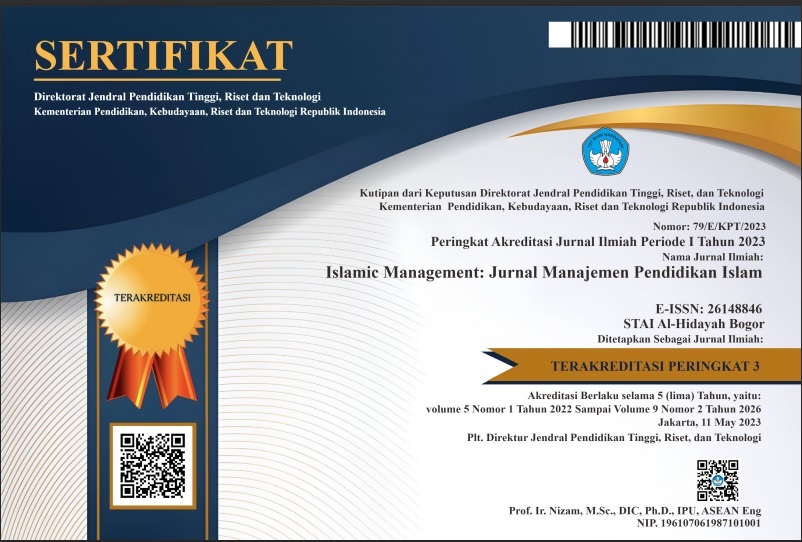IMPLEMENTATION OF MULTICULTURAL VALUES IN ISLAMIC RELIGIOUS EDUCATION AT MAS DARUL MURSYID
DOI:
https://doi.org/10.30868/im.v8i01.7780Keywords:
Multiculturalism, Islamic Religious Education, Implementation of ValuesAbstract
This study aims to analyze the implementation of multicultural values in Islamic Religious Education (PAI) at the Private Madrasah Aliyah (MAS) Darul Mursyid. Multiculturalism is an essential concept for fostering tolerance and harmony among religious communities in Indonesia; however, its implementation still requires special attention within the educational context. The research was conducted using a descriptive qualitative method, employing data collection techniques such as observation, in-depth interviews, and document analysis. The research subjects included PAI teachers, the head of the madrasah, and students at MAS Darul Mursyid. The findings indicate that the implementation of multicultural values in the PAI curriculum is carried out through several approaches: (1) the development of an inclusive curriculum, (2) dialogic and interactive teaching methods, (3) emphasis on values of togetherness and mutual respect, and (4) extracurricular activities that support multicultural understanding. The study reveals that PAI teachers have integrated multicultural values into lesson plans (RPP) by employing teaching strategies that promote tolerance, inclusivity, and mutual understanding. Success indicators include an enhanced understanding among students of religious, cultural, and ethnic diversity, as well as the development of mutual respect among members of the school community. The implications of this research highlight the need for the continuous development of PAI teaching models to internalize multicultural values. Recommendations from the study include curriculum refinement, teacher training, and the development of more participatory teaching methods.
References
Ambarudin, R. I. (2016). Pendidikan multikultural untuk membangun bangsa yang nasionalis religius. Jurnal Civics: Media Kajian Kewarganegaraan, 13(1), 28-45.
Ambarwangi, S., & Suharto, S. (2013). Pendidikan Multikultural di Sekolah Melalui Pendidikan Seni Tradisi. Harmonia: Journal Of Arts Research And Education, 13(1).
Azra, A. (2007). Identitas dan Krisis Budaya: Membangun Multikulturalisme Indonesia. Jakarta: Fakultas Pasca Sarjana UIN Syarif Hidayatullah.
Azra, A. (2013). Pendidikan Agama Islam Kontemporer. Remaja Rosdakarya.
Banks, J. A. (2016). Multicultural Education: Characteristics and Goals. In J. A. Banks & C. A. McGee Banks (Eds.), Multicultural Education: Issues and Perspectives (9th ed.). Hoboken, NJ: Wiley.
Banks, J.A. (2009). Multicultural Education: Characteristics and Goals. John Wiley & Sons.
Haryati, T. A. (2009). Islam dan Pendidikan Multikultural. TADRIS: Jurnal Pendidikan Islam, 4(2).
Ismail, I. (2013). Nilai-Nilai Karakter Dalam Pendidikan Agama Islam Berbasis Multikultural. TADRIS: Jurnal Pendidikan Islam, 8(2), 215-234.
Kamal, M. (2013). Pendidikan multikultural bagi masyarakat Indonesia yang majemuk. Al-Ta Lim Journal, 20(3), 451-458.
Mahfud, C. (2016). Pendidikan Multikultural. Pustaka Pelajar.
Mania, S. (2010). Implementasi Pendidikan Multikultural dalam Pembelajaran. Lentera Pendidikan: Jurnal Ilmu Tarbiyah Dan Keguruan, 13(1), 78-91.
Nurdin, E. (2015). "Implementasi Nilai-Nilai Multikulturalisme dalam Pendidikan Agama". Jurnal Pendidikan Islam, 4(2), 245-267.
Tilaar, H. A. R. (2009). Multikulturalisme: Tantangan-tantangan Global Masa Depan dalam Transformasi Pendidikan Nasional. Jakarta: Gramedia Pustaka Utama.
Tilaar, H.A.R. (2007). Mengindonesiakan Ethos Pendidikan. Penerbit Kompas.
Downloads
Published
How to Cite
Issue
Section
Citation Check
License
Copyright (c) 2025 Hendra Irwandi Siregar, Aisahrani Ritonga, Yusrina Gultom, Dewi Chandra, Hasan Asari

This work is licensed under a Creative Commons Attribution-ShareAlike 4.0 International License.
Authors who publish with this journal agree to the following terms:
- Authors retain copyright and grant the journal right of first publication with the work simultaneously licensed under a Creative Commons Attribution License that allows others to share the work with an acknowledgment of the work's authorship and initial publication in this journal.
- Authors are able to enter into separate, additional contractual arrangements for the non-exclusive distribution of the journal's published version of the work (e.g., post it to an institutional repository or publish it in a book), with an acknowledgment of its initial publication in this journal.
- Authors are permitted and encouraged to post their work online (e.g., in institutional repositories or on their website) prior to and during the submission process, as it can lead to productive exchanges, as well as earlier and greater citation of published work (See The Effect of Open Access).






